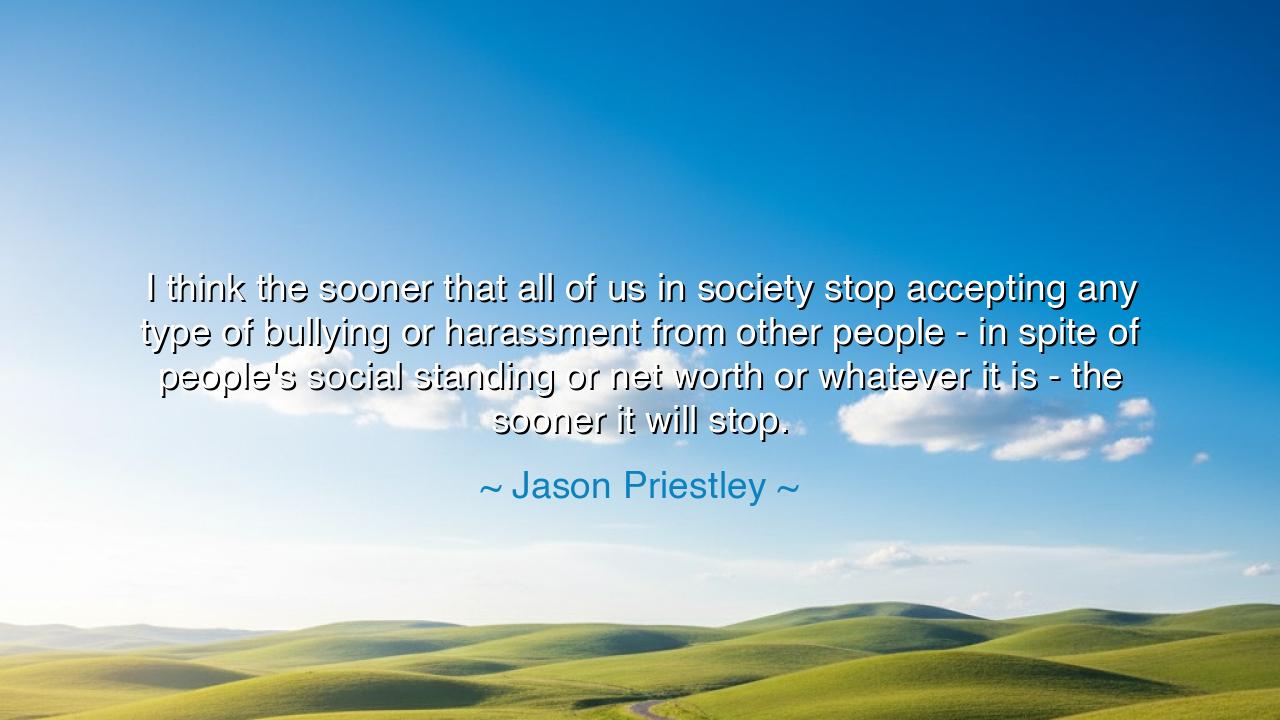
I think the sooner that all of us in society stop accepting any
I think the sooner that all of us in society stop accepting any type of bullying or harassment from other people - in spite of people's social standing or net worth or whatever it is - the sooner it will stop.






Hear the voice of Jason Priestley, who speaks not from vanity but from clarity: “I think the sooner that all of us in society stop accepting any type of bullying or harassment from other people—in spite of people’s social standing or net worth or whatever it is—the sooner it will stop.” These words are not only about cruelty in the schoolyard or insult in the street; they are about the deeper sickness of power, the acceptance of abuse cloaked in wealth, fame, or influence. Priestley calls us to see that what persists in our world is not only the act of cruelty itself, but the silence of those who accept it.
The meaning is sharp and uncompromising. Bullying and harassment survive only where they are tolerated. If the victim bows their head in silence, or the witness averts their gaze, then the cruelty grows bold. And when society excuses such behavior because of “social standing” or “net worth,” it gives power to the bully and strips dignity from the victim. Thus, Priestley’s words remind us that the cure lies not only in punishing the cruel, but in removing our collective acceptance of their cruelty. When the many refuse to bow, the power of the few who bully collapses.
The ancients knew this truth well. In the court of tyrants, the cruel ruled because the people whispered but did not resist. Yet in Athens, when the citizens rose together against Peisistratus and later against his descendants, the tyranny was broken. The bullying of the few had been upheld by silence, but once the silence ended, freedom returned. So too with every oppressor: their cruelty is not sustained by their strength, but by the acceptance of the many.
Consider also the story of the American Civil Rights Movement. For centuries, Black Americans endured humiliation, segregation, and harassment upheld by law and custom. Those in power were protected by wealth, by politics, by social standing. Yet when the people—students, mothers, workers, pastors—refused any longer to accept these abuses, the system began to unravel. The Montgomery Bus Boycott, sparked by Rosa Parks’ refusal to yield, is a shining example. The people stopped accepting, and in that refusal lay the beginning of transformation. Priestley’s words are echoed here: oppression ends when acceptance ends.
But look around today, and see how often wealth or fame shields cruelty from consequence. In workplaces, powerful executives have harassed employees without fear, knowing that their “net worth” or “standing” would silence the complaints of the weak. In politics, leaders have bullied with words and actions, shielded by their position. Even in schools, the children who bully often go unchecked because of their family’s influence or their social reputation. These are the very examples Priestley warns us against: when we excuse cruelty because of status, we feed the fire that consumes dignity.
The lesson is both heroic and practical: do not accept bullying, in any form, from any person, no matter their rank or riches. Speak when others are silent. Stand beside the harassed when others turn away. Teach children that cruelty is not power, and that silence in the face of cruelty is not peace but surrender. Remember that society is not shaped by the few at the top, but by the choices of the many who tolerate or resist.
What, then, must we do? Begin with ourselves. Refuse to excuse the harsh word, the cruel jest, the abuse of power, even when it comes from those admired by the world. Create communities—in schools, workplaces, families—where the dignity of all is honored equally, where wealth and standing do not excuse wrongdoing. And when we see bullying, let us remember that our response is the measure of our civilization: silence strengthens it, resistance ends it.
Thus remember: the oppressor is powerful only because the world permits it. Jason Priestley’s words are a call to courage—that if all of society refuses to accept cruelty, the day will come when cruelty itself finds no ground to stand on. And on that day, human dignity will rise, unbroken, for all.






AAdministratorAdministrator
Welcome, honored guests. Please leave a comment, we will respond soon